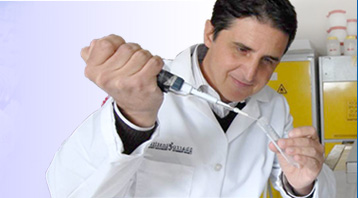 |
||
 |
The laboratory projects includes studies on the haracterization of cyclin-dependent kinase, development of novel drugs and retroviral and lentiviral-mediated gene transfer of pRb2/p130. |
 |
|
BIOGRAPHY DETAILS
Gaetano Romano, Ph.D. is currently a Research Associate Professor and Director of the Drug Development and Gene Therapy Programs at the College of Science and Technology at Temple University. Dr. Romano is a member of the Reuter Insights Expert Network and of the International Society for Stem Cell Research (ISCCR). He serves as grant reviewer for the French Institut National de la Sante’ et de la Recherche Medicale (Inserm) and for the Department of Defense – U.S. Army Medical Research and Materiel Command (USAMRMC) – Congressional Directed Medical Research Program (CDMRP). |
||||||
|
PUBLICATIONS (2004-2009) Romano, G., Marino, I.R., Pentimalli, F., Adamo, V. and Giordano, A. Insertional mutagenesis and development of malignancies induced by integrating gene delivery systems: implications for the design of safer gene-based interventions in patients. Drug News & Perspectives, (in press). Romano, G. and Giordano, A. Role of cyclin-dependent kinase 9-related pathway in mammalian gene expression and human diseases. Cell Cycle, 7: 3664-3668, 2008. Romano, G. Artificial reprogramming of human somatic cells to generate pluripotent stem cells: a possible alternative to the controversial use of human embryonic stem cells. Drug News & Perspectives, 21: 440-445, 2008. Romano, G. The standpoint of stem cell research. Drug News & Perspectives, 21: 408-412, 2008. Romano, G. An overview on gene therapy programs. Drug News & Perspectives, 21: 345-351, 2008. Fucito, A., Lucchetti, C., Giordano, A. and Romano, G. Genetic and epigenetic alterations in breast cancer: what are the perspectives for clinical practice? The International Journal of Biochemistry & Cell Biology, 40: 565-575, 2008. Sun, A., Bagella, L., Romano, G. and Giordano, A. From G0 to G1 phase: a view of the role played by the retinoblastoma (Rb) family members in the Rb-E2F pathway. Journal of Cellular Biochemistry, 102: 1400-1404, 2007. Puca, A., Russo, G., Romano, G. and Giordano, A. Chaotic dynamic stabilities and instabilities of hematopoietic stem cell growth plasticity. Journal of Cellular Physiology, 213: 672-678, 2007. Romano, G. Current development of non-viral-mediated gene transfer. Drug News & Perspectives, 20: 227-231, 2007. Giordano, A., Fucito, A., Romano, G. and Marino, I.R. Carcinogenesis and environment: the cancer stem cell hypothesis and implications for the development of novel therapeutics and diagnostics. Frontiers in Bioscience, 12: 3475-3482, 2007. Romano, G., Macaluso, M., Lucchetti, C. and Iacovitti, L. Transcription and epigenetic profile of the promoter, first exon and first intron of the human tyrosine hydroxylase gene. Journal of Cellular Physiology, 211: 431-438, 2007. Romano, G. Perspectives and controversies in the field of stem cell research. Drug News & Perspectives, 19: 433-439, 2006. Romano, G. The controversial role of adenoviral-mediated gene transfer in gene therapy programs: where do we stand? Drug News & Perspectives, 19: 99-106, 2006. Jin, H., Romano, G., Marshall, C., Donaldson, A.E., Suon, S. and Iacovitti, L. Tyrosine hydroxylase gene regulation in human neuronal progenitor cells does not depend on Nurr1 as in the murine and rat systems. Journal of Cellular Physiology, 207: 49-57, 2006. Romano, G. The role of adult stem cells in carcinogenesis. Drug News & Perspectives, 18: 555-559, 2005. Romano, G. Current development of adeno-associated viral vectors. Drug News & Perspectives, 18: 311-316, 2005. Romano, G., Suon, S., Jin, H., Donaldson, A.E. and Iacovitti, L. Characterization of five evolutionary conserved regions of the human tyrosine hydroxylase (TH) promoter: implications for the engineering of a human TH minimal promoter assembled in a self-inactivating lentiviral vector system. Journal of Cellular Physiology, 204: 666-677, 2005. Romano, G. Current development of lentiviral-mediated gene transfer. Drug News & Perspectives, 18: 128-134, 2005. Romano, G. Stem cell transplantation therapy: controversy over ethical issues and clinical relevance. Drug News & Perspectives, 17: 637-645, 2004. Tonini, T., Gabellini, C., Bagella, L., D’Andrilli, G., Masciullo, V., Romano, G., Scambia, G., Zupi, G. and Giordano, A. pRB2/p130 decreases sensitivity to apoptosis induced by camptothecin and doxorubicin but not by taxol. Clinical Cancer Research, 10: 8085-8093, 2004. Giordano, A. and Romano, G. Eds. “Cell cycle control and dysregulation protocols: cyclins, cyclin-dependent kinases and other factors. Methods in Molecular Biology”, The Humana Press Inc., July 2004. Romano, G. Systems for regulated or tissue specific gene expression. Drug News & Perspectives, 17: 85-90, 2004.
|
|
TOP | CONTACT | SALUTE-HEALTH | DONATE | LINKS |
|
© Copyright 2003 - 2010, Sbarro Health Research Organization,All rights reserved. |

 Gaetano Romano, Ph.D.
Gaetano Romano, Ph.D.